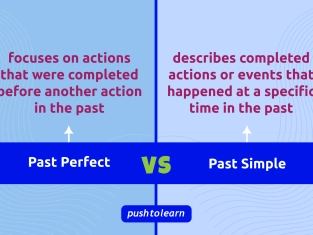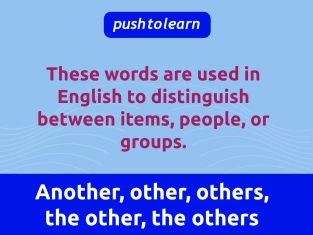by PushtoLearn
Past Perfect vs Past Perfect Continuous
Table of Contents
Past Perfect and Past Perfect Continuous – Exercises
These exercises focus on Past Perfect and Past Perfect Continuous
What is Past Perfect?
The Past Perfect focuses on actions that were completed before another action in the past. It answers the question: What had happened?
Structure:
|
Subject |
+ |
had |
+ past participle (verb 3) |
+ Object |
|
I |
had |
finished |
my homework. |
|
|
She |
had |
eaten |
lunch. |
Examples of Past Perfect:
-
Before another past action:
-
She had finished her work before the meeting started.
(Her work was done, then the meeting began.) -
With time expressions (by, before):
-
By the time we arrived, the train had already left.
(The train left earlier, before we arrived.) -
Explaining a result in the past:
-
He was happy because he had won the competition.
(Winning happened before feeling happy.)

What is Past Perfect Continuous?
The Past Perfect Continuous focuses on actions that were ongoing before another action in the past. It emphasizes the duration or the cause of something.
Structure:
|
Subject |
+ |
had been |
+ verb (-ing) |
+ Object/Time |
|
I |
had been |
working |
for two hours. |
|
|
They |
had been |
playing |
before dinner. |
Examples of Past Perfect Continuous:
-
Before another past action (duration):
-
She had been working for two hours before she took a break.
(The work was ongoing before she stopped for a break.) -
Cause and effect:
-
He was tired because he had been running all morning.
(Running explains why he was tired.) -
Describing an interrupted action:
-
We had been driving for hours when the car broke down.
(Driving happened first, then the car broke down.)
Key Differences
|
Aspect |
Past Perfect |
Past Perfect Continuous |
|
Focus |
Completed action. |
Ongoing action (duration or cause). |
|
Use |
What happened before another past action. |
How long something had been happening. |
|
Question it answers |
What had happened? |
How long had it been happening? |
|
Example |
She had finished her homework before 8. |
She had been studying for two hours. |
Common Time Expressions
Both tenses often use these time expressions:
|
Expression |
Past Perfect Example |
Past Perfect Continuous Example |
|
Before |
I had eaten lunch before the meeting. |
I had been eating lunch before the meeting. |
|
By the time |
By the time we arrived, she had left. |
By the time we arrived, she had been waiting. |
|
For |
- |
They had been waiting for two hours. |
|
Since |
- |
He had been studying since morning. |
When to Use Each Tense
|
Situation |
Past Perfect Example |
Past Perfect Continuous Example |
|
Action completed before another |
She had left when we arrived. |
- |
|
Focus on the result |
I was tired because I had walked a lot. |
I was tired because I had been walking. |
|
Focus on the duration |
- |
We had been working for hours. |
|
Cause and effect |
She was upset because he had forgotten her birthday. |
She was upset because he had been ignoring her. |
Common Errors
-
Mixing up the tenses
-
Incorrect: I had been finished my homework before dinner.
-
Correct: I had finished my homework before dinner.
-
Using the wrong auxiliary verb
-
Incorrect: He had being working all day.
-
Correct: He had been working all day.
-
Forgetting the time frame or second action
-
Incorrect: She had been cooking.
-
Correct: She had been cooking before they arrived.
FAQ
What is the main difference between Past Perfect and Past Perfect Continuous?
-
Past Perfect describes completed actions in the past.
-
Past Perfect Continuous emphasizes duration or cause of an action in the past.
Can I use "for" and "since" with Past Perfect?
No, "for" and "since" are typically used with the Past Perfect Continuous.
Example: He had been working for three hours.
Is it okay to use Past Perfect Continuous without a time frame?
Yes, but it’s more natural to include one.
Example: She was angry because he had been ignoring her.
Can Past Perfect and Past Perfect Continuous appear in the same sentence?
Yes, when one action is ongoing and another is completed:
-
She had been studying for hours when she had finished the project.
Which is more common, Past Perfect or Past Perfect Continuous?
The Past Perfect is generally more common because we often focus on completed actions.

